Last Updated on December 17, 2025 by Hannah Stephenson
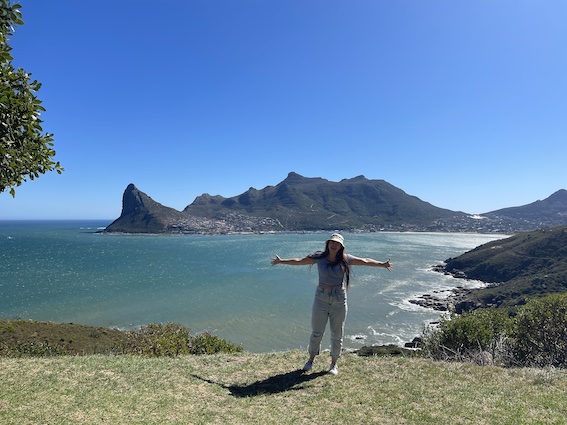
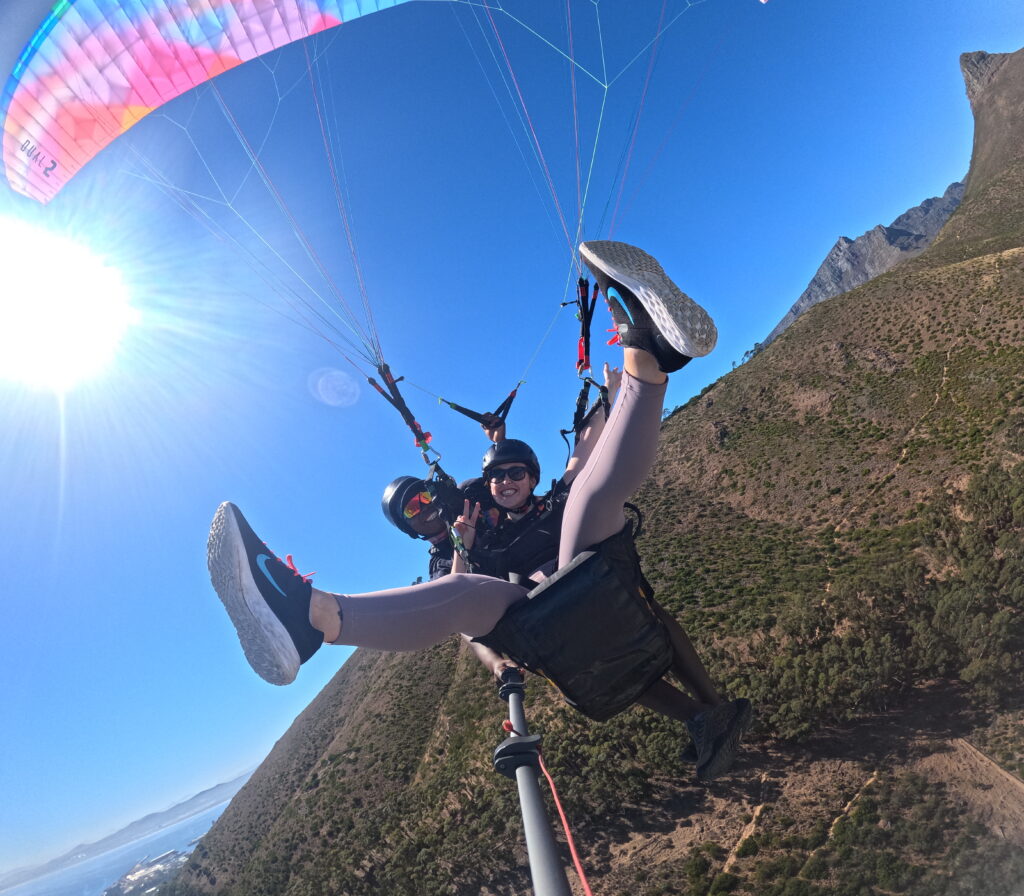
Planning a trip to Cape Town but worried about safety?
I get it. I was once in your shoes! But since moving here in 2021, I’ve always felt reasonably safe and comfortable in Cape Town. Although Cape Town is statistically a very dangerous city, most tourists don’t have any problems wen visiting.
You absolutely do need to have your wits about you here but you really don’t need to be afraid. You just need to know what’s up! And with that in mind, I’ve compiled this guide to staying safe in the Mother City.
- How dangerous is Cape Town REALLY?
- How to Stay Safe in Cape Town
- 1) Stick to the Safe Areas
- 2) Use Uber, Not Bolt at Night
- 3) Don’t Walk Alone at Night
- 4) Leave the Beach at Sunset
- 5) Don’t go out on Long Street
- 6) Don’t leave your valuables in the car
- 7) Use the ATMs inside banks or shopping centers
- 8) Don’t carry a ton of cash
- 9) Don’t leave your belongings unattended when you swim
- 10) Avoid Taxis
- 11) Book Hiking Tours
- 12) Get a SIM card
- 13) Make sure you have travel insurance
- Cape Town Safety FAQS:
How dangerous is Cape Town REALLY?

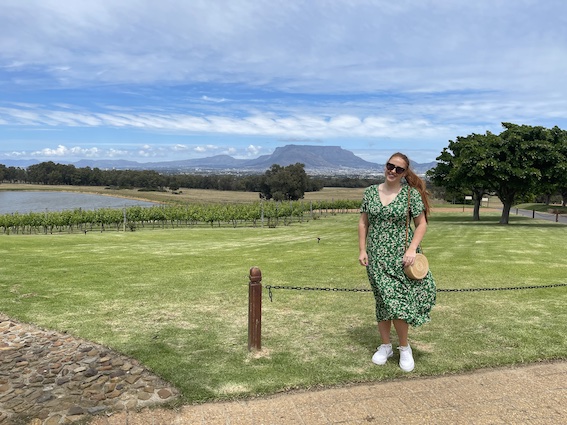
This is a multi-faceted topic, but the long and short of it is that Cape Town is a safe travel destination.
In Cape Town, a lot of the crime is gang-related and contained to certain areas of the city, so the risk to you as someone who will probably be sticking to the nicer parts of town is lower than the official statistics would make it seem.
You can’t walk around most areas late at night or party on the beach after dark, but if you know what’s what then it’s fairly easy to keep yourself safe. Keep on reading for my top tips!
How to Stay Safe in Cape Town
1) Stick to the Safe Areas

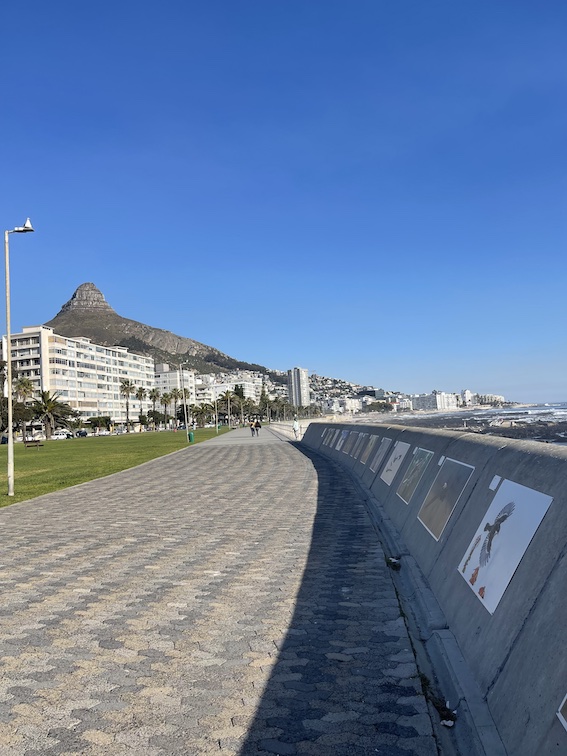
This will probably come naturally to you anyway, as all of the best things to do in Cape Town tend to be in the safer areas of the city.
Generally speaking, the city bowl and Atlantic Seaboard are pretty safe. That’s not to say there aren’t social problems here, because there are. But they’re much, much milder than they are in the townships outside of the city, like Langa, Guguletu, and Khayelitsha.
In a nutshell, the best areas (and safest) to explore are:
- Camps Bay
- Sea Point
- Green Point
- De Waterkant
- Clifton
- V&A Waterfront
- Gardens
- Tamboerskloof
- Bo Kaap (during the day)
- The CBD (but avoid Long Street at night)
If you’re on holiday in Cape Town, you’ll probably naturally stick to these areas anyway! I’ve also included a map below so you can get a sense of the city’s layout.
These are all super central areas. You’ll also be fine to visit Muizenberg and Kalk Bay down the peninsula, go wine tasting in Constantia, explore the Winelands, and enjoy Chapman’s Peak Scenic Drive between Hout Bay and Noordhoek.
2) Use Uber, Not Bolt at Night
Uber is safe to use in Cape Town. I have taken countless Ubers alone in the wee hours of the morning and I’ve never had any problems. In fact, Uber is the best way to get around in Cape Town.
Bolt can be cheaper during the day, so it’s fine for short journeys around the city. I’ve used it plenty of times during the day without issue, but I do not recommend using it at night. I believe that they don’t have as strict safety standards as Uber and I’ve seen a few reports of assault floating around social media.
This isn’t my personal experience, but Uber definitely have better vetting processes for driving, so stick to the OG ride hailing app at night.
3) Don’t Walk Alone at Night
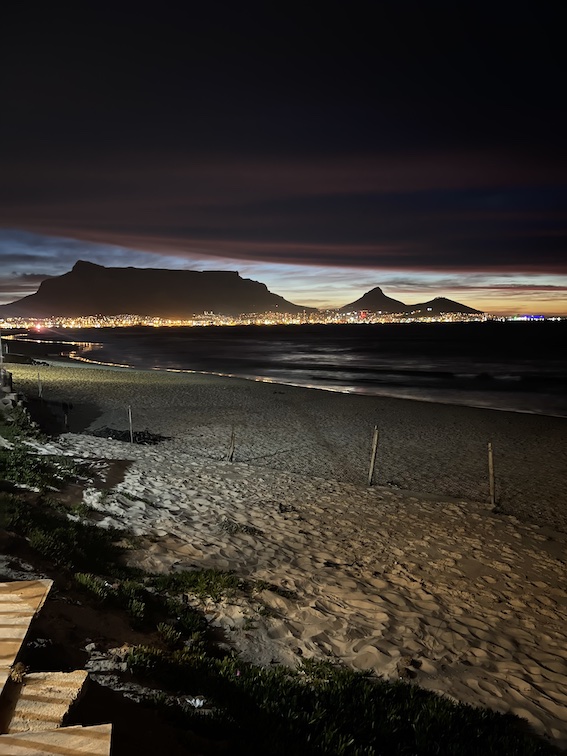

Once the sun sets in Cape Town, take an Uber. It’s as simple as that.
I love exploring the city on foot and I walk alone all the time during the day. But once night falls, I get my butt in an Uber. It’s just not worth the risk.
I do walk down Kloof Street at night with friends, because it’s a party street and there are always people around. Plus, if you’re walking 200 meters from one bar to the next, you can hardly call an Uber for that. Obviously, common sense applies, but in general, you’re always better off taking an Uber after dark.
4) Leave the Beach at Sunset
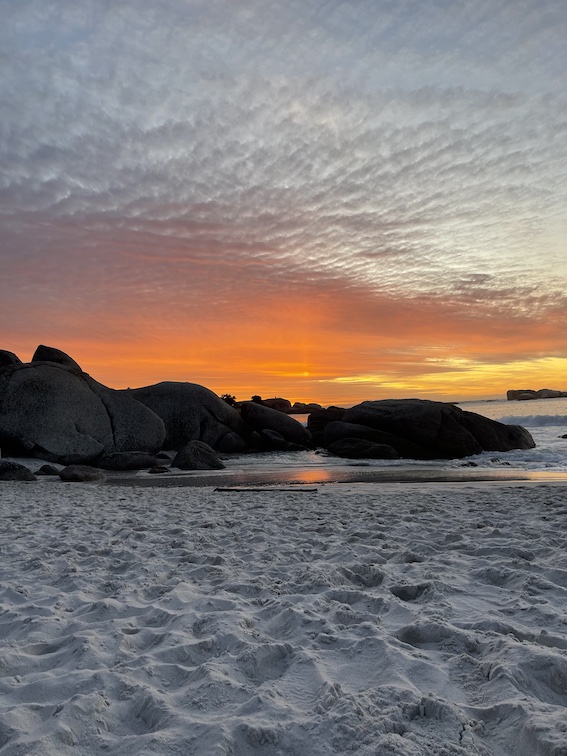
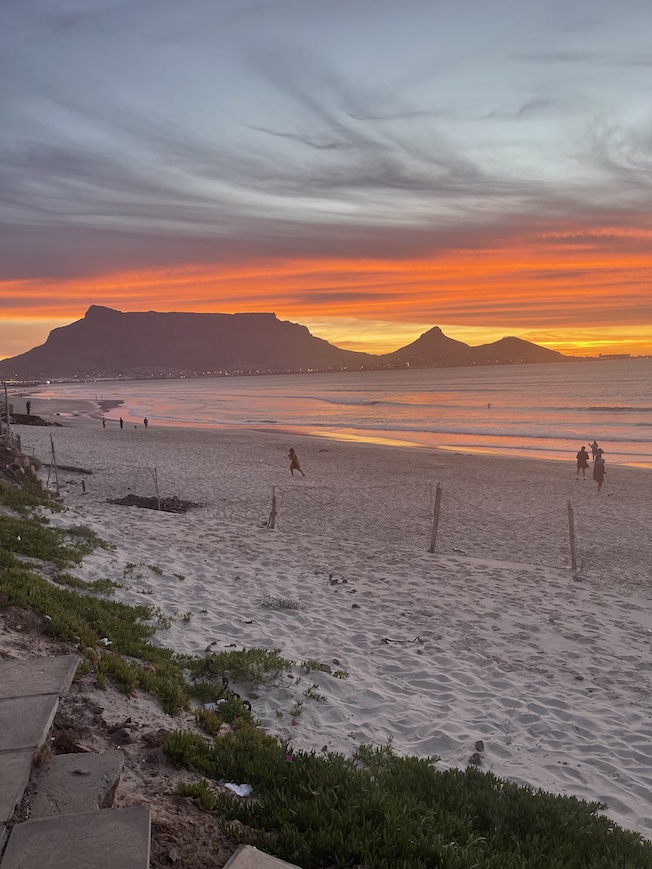
Cape Town’s beaches are perfectly safe during the day, but I don’t recommend hanging around for too long after sunset. To be honest, this isn’t really a big deal because the temperature usually drops pretty fast after sunset, so you probably won’t want to hang around for long anyway!
5) Don’t go out on Long Street
Long Street is another of Cape Town’s biggest party streets, but it has a really bad reputation for pickpocketing, as well as more violent muggings. Pickpocketing rings operate around here and if you go out on this street, you have a strong chance of coming home minus your phone.
There are tons of other great places to enjoy Cape Town’s nightlife, so I recommend heading out elsewhere.
6) Don’t leave your valuables in the car
If you’re planning to rent a car in Cape Town, don’t leave any valuables in your car. Car break ins are very common in Cape Town. In fact, when I borrowed my friend’s car she even advised me not to leave jumpers or jackets in the car, because they might attract thieves. When you get out of the car, take everything with you, even if you won’t be gone for long.
7) Use the ATMs inside banks or shopping centers
To be honest, if you’ve got a fee-free credit or debit card (like Monzo) then you won’t need to use ATMs very often. When you do, though, try to use ones inside banks or shopping centres. There will be security around just in case.
When you use ATMs on the street you might be approached by beggars while you’re withdrawing money, which can be intimidating, or scam artists might come and try to “help” you. For more on scams to avoid in Cape Town, check out this guide.
8) Don’t carry a ton of cash
You can pay with a card or your phone pretty much everywhere in Cape Town, so there’s no need to carry lots of cash around with you. In fact, a TON of businesses are going cashless these days, so why take the risk?
I usually just take my phone out because at least if that gets stolen, I’ve still got my wallet and physical bank cards to fall back on.
9) Don’t leave your belongings unattended when you swim
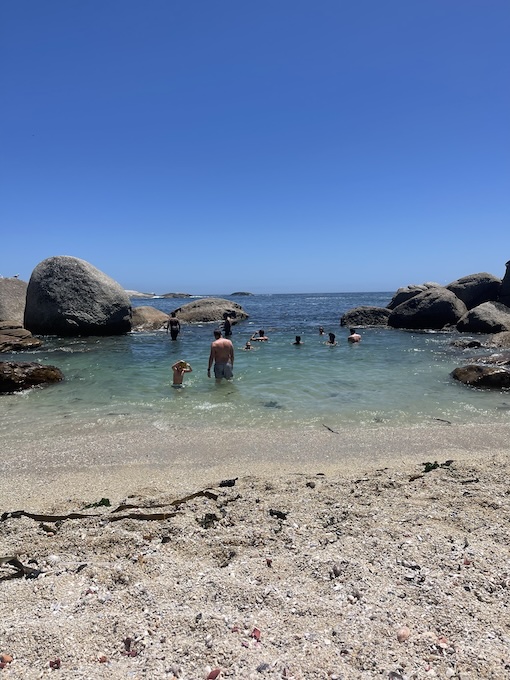
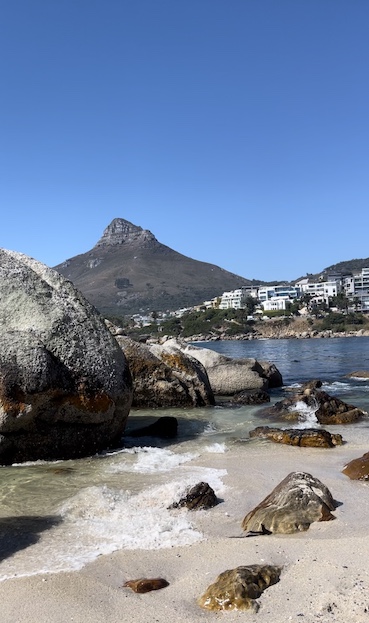
The beaches in Cape Town are very safe during the day. However I still don’t recommend leaving your belongings behind while you take a dip in the ocean. Friends and I usually take turns because since the water is freezing so you can’t stay in for long!
And if you think you’re a good judge of character, you can always ask some kind-looking nearby strangers to watch your stuff while you swim.
10) Avoid Taxis
The word “taxi” means something different in South Africa than it does in the rest of the world.
A taxi here refers to a public shuttle bus. It’s a very cheap form of transport, but taxis drive incredibly erratically and scam foreigners.
You’ll definitely see taxis around, but you definitely don’t want to be on one. They’re not safe for tourists.
Be careful at the airport, because taxi agents will come up to you and offer you a taxi, quite possibly hoping that you’re a first-timer who doesn’t know what a South African taxi is. They’ll charge you an exorbitant price and you may or may not get dropped off in the right location – it’s the luck of the draw, really.
Taking an Uber to your hotel from the airport is cheaper, faster, and safer. I have had taxi drivers approach me and tell me that they’re “an offline Uber” or try and get me into their taxi telling me that they were my Uber driver. This may happen to you too, but just politely refuse and walk away until your ride turns up.
I’ve got a whole post dedicated to getting from the airport to the city, so check it out!
11) Book Hiking Tours
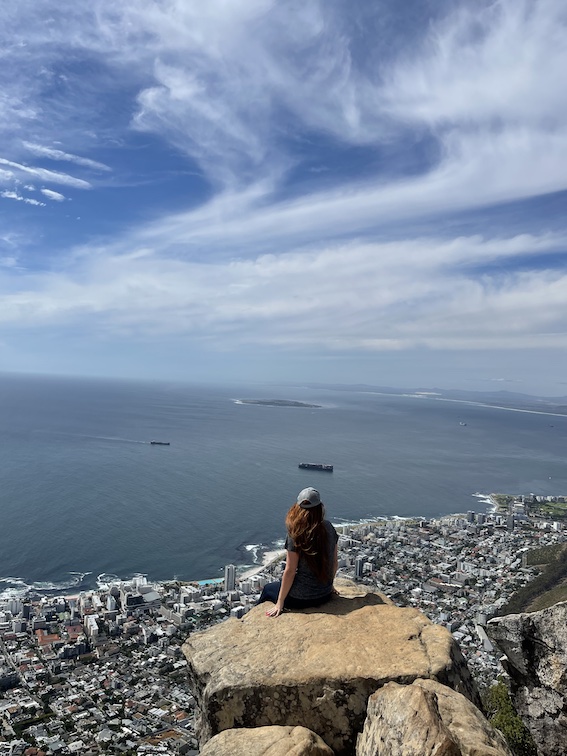
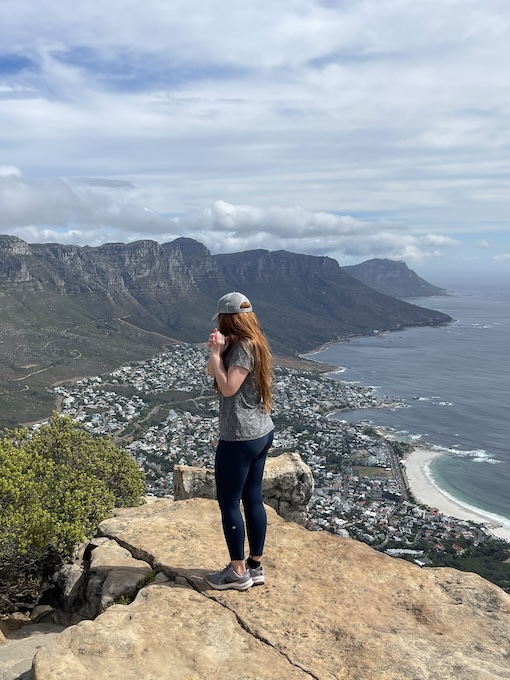
I never hike alone in Cape Town, but I do feel safe just going with one other friend. However, there have been some reports of muggings on the mountains recently, so if you’re concerned, the best thing to do is book a hiking tour. I’ve actually got a whole article on the best guided hikes in Cape Town here.
And if you want to hike Lion’s Head at sunrise or sunset, I would definitely advise booking a tour. I’d certainly be worried about scrambling in the dark without a professional on hand!
This tour has over 300 5-star reviews and promises a morning (or evening) that you’ll never forget. It includes head torches, flashlights, and snacks, so there’s no need to go shopping beforehand! Plus, you get free cancellation when you book through Viator.
12) Get a SIM card
I think it’s always a good idea to get a local SIM card when you travel, but it’s especially important in Cape Town because there’s not that much public WiFi available. Plus, the city doesn’t have a very extensive public transport network so you’ll need mobile data to call an Uber.
Plus, then you’ll be able to use Google Maps to help you get around and stay in contact with friends. You’ll definitely be safer with a SIM!
If you want to get a physical SIM card, I’ve found that Vodacom has the most reliable reception. You can buy a 30-day tourist SIM at the airport – there’s a booth at arrivals.
However, these days I actually just tend to get an e-SIM because I like being able to top it up remotely. I use AirAlo because I think they offer reasonable rates and great service!
13) Make sure you have travel insurance
When you’re going somewhere like Cape Town, where muggings are unfortunately common, you definitely want to have travel insurance.
World Nomads are also a popular choice if you’re looking for something affordable. But if you have a credit card, definitely look into what that covers before spending extra money on travel insurance.
Cape Town Safety FAQS:
Is Cape Town or Johannesburg safer?
Cape Town is safer than Johannesburg for travellers.
Crime statistics are pretty bad in both cities, but remember that those also include the townships. As a tourist or digital nomad, you’re probably not going to be going anywhere near those.
Instead, you’re most likely going to be sticking to the downtown and central areas where all of the fun stuff is. In this case, Cape Town is much safer.
Crime in Cape Town is more concentrated in certain areas, where as in Johannesburg it just seems to be everywhere!
Lots of my born-and-bred Capetonian friends have told me how unsafe they feel in Johannesburg, and Cape Town is generally considered to be a much better place to travel and live.
Is it safe to drink tap water in Cape Town?
Yes, it’s totally safe to drink tap water here! I’ve been drinking it for years, and so has everyone else I know, and we’re all fine!
Is it safe to swim at the beaches?
Yes, most of the time. Sometimes, the waves at the Clifton and Camps Bay beaches can get rough but there are always lifeguards around. If the waves get too dangerous, they won’t let you go in the water. And Cape Town is home to lots of blue flag beaches, which means that the water is super clean!
Thanks so much for reading this guide! I hope it has given you some useful advice and made you feel more confident about your trip to Cape Town. For more resources on how to have a safe and fun time in the city, check out the following articles:
